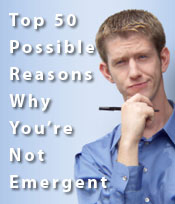
Greg Boyd, who I enjoy reading, wrote in his blog,
“It’s hard to deny that capitalism is the best economic system around. It creates wealth far better than feudalism, communism, socialism or any other system one could name. But for all its advantages, capitalism has one major drawback that Kingdom people need to be concerned about: it needs people to stay perpetually hungry for more. If Americans as a whole ever followed Paul’s instruction to be content with basic food and clothing and not pursue wealth (1 Tim. 6:6-11), the system would come to a grinding halt. The undeniable truth is that capitalism runs on greed.”
When I first read this, I had to stop for a second. Something didn’t sit right and so I had to really ponder what it was.
I grew up in a entrepreneurial family. My father and my step father were very successful men in business and worked very hard for it. The system we grew up in, especially Silicon Valley supported opportunity. Capitalism, which is the ideology behind a free market was an integral part of it. Much like Greg said, we would not have enjoyed the prosperity under communism, feudalism, or socialism. Only capitalism would set the stage for growth.
The very idea behind capitalism is a free market of ideas to make something better. The pooling of capital supports the idea. You build an organization around the better idea and sell it to people. Better ideas in theory make a better life. The free market allows competition, to a certain extent, to regulate prices based upon what people are willing to pay. It even supports new ideas by protecting them for a short time through patent protection, if the idea is original, allowing inventors to recoup R&D costs. The system doesn’t require “more” in order to operate, as Greg states. It only requires a transaction, or the movement of goods. The system isn’t perfect, but as Greg said, it works. And it supports those who are willing to work. Communism, on the other hand, supports oppression because it creates a system of reliance on the a government for handouts. Feudalism never allows people to rise above poverty. Socialism takes away people incentive to work hard because everything they do will become part of the state.
I grew up in Silicon Valley and got to live through the Internet bubble. Although this period may be known for its excesses, which I experienced first hand, it also was pivotal in creating so many good things. It is very doubtful that I would be blogging right now had we not had this period. This medium has revolutionized communication and the critique of thought in ways that the world has never known before.
So after living through it, I would offer a different perspective than Greg. I would suggest the inverse, “greed feeds on capitalism”. Capitalism is a system. It has no thought, feeling, or a mind. It makes no decisions. It it simply a potential operating system. Much like a game people play, it is the people who define the rules and whether they follow them or not. Capitalism is used by people, broken people. Greed is on the other hand a living response to brokenness and disconnectedness from God. It is our desire to horde for the sake of creating protective systems around our heart, so we won’t be hurt.
I say this because I experienced a very different life than what Greg is saying. I saw the power of wealth to be of good service, to restore people’s life, to be of good steward to what God had given us. My father used his wealth in a strangely powerful way for other people. I would suggest that what Greg highlights in the rest of his post is created by greed, not capitalism.
A really great counter example is Blake Mycoskie, who developed TOMS shoes. Blake took a simple inspiring idea and change a little part of the world. But he did so in a redeeming way. He used capitalism and made it work for good.
To call capitalism the problem is to miss the point completely. It would be to call the great work of so many business men who use their resources and wealth for good and for the Kingdom, wrong. Capitalism is not the problem. People’s brokenness is the problem and it looks like greed.
Read Full Post »















